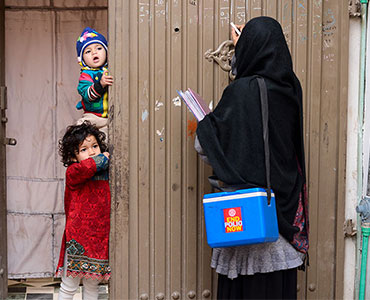Sometimes walking, crawling or even playing outside was a great source of pain for 2-year-old Basrana from Bannu and 1-year-old Javeria from Lakki Marwat. In May of this year, Basrana and Javeria were diagnosed with poliomyelitis, a highly infectious viral disease that largely affects young children.
The polio virus is transmitted person-to-person and is spread mainly through the faecal-oral route or, less frequently, by a common vehicle, such as contaminated water or food. Polio multiplies in the intestine, from where it can invade the nervous system and cause paralysis. There is no cure for polio, and it can only be prevented by immunization.
In the days before their diagnosis, the girls began suffering from high grade fever and weakness in their limbs. A series of medical examinations, including an Acute Flaccid Paralysis examination and stool testing, confirmed that both girls had contracted the polio virus, which in turn had caused substantial impact to the functioning of their legs.

Due to the Polio Rehabilitation Initiative (PRI), however, children like Basrana and Javeria still have some hope of regaining their mobility, and living a healthy, active life. The PRI is an innovative landmark initiative in Pakistan, which provides rapid assessment of polio cases and rehabilitation services to mitigate secondary complications caused by paralysis by polio.
With PRI’s support, Basrana was provided physiotherapy sessions which helped her regain the ability to walk. Javeria, on the other hand, was given an orthotic device for her knee, ankle and foot which helped her to stand once again. Since 2007, initiatives like PRI have supported many children through medical and social rehabilitation right at the door step of their homes, including the provision of orthotic devices, surgical procedures, physiotherapy, as well as regular follow-up services.
Children like Basrana and Javeria both hail from districts with high rates of missed children during campaign rounds as well as parental refusals to the vaccine. Unfortunately, as more and more parents in these areas choose to refuse the vaccine or fail to it administered to their children, the more susceptible their children become to the virus. As such, reports from the National Emergency Operations Centre of the Pakistan Polio Eradication Programme indicate that the virus has been spreading aggressively across the Khyber Pakthunkwa province in 2019, infecting up to 22 children from the Bannu district alone.
Up to 60 cases of wild polio virus have been reported from Pakistan so far this year. As long as the virus continues to exist in Pakistan, more and more young girls like Basrana and Javeria continue to be at risk of a daunting future marred by polio.
